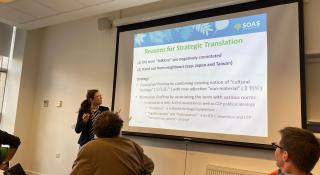
Breadcrumbs navigation
How can we make sure states do not only sign international anticorruption agreements, but also comply with them?
Hortense Jongen discusses her new article 'Peer review and compliance with international anti-corruption norms: Insights from the OECD Working Group on Bribery', published this week in BISA journal Review of International Studies. The article develops a theoretical framework to study the different processes and mechanisms through which peer reviews can contribute to state compliance.
Over the past decades, the number of international agreements and policy instruments to eradicate corruption has increased considerably. What was once considered a mere symptom of incomplete economic modernization and an acceptable way of doing business abroad, is today widely recognised as a crime with severe social, political, economic, and environmental consequences. Corruption breeds inequality, stifles economic development, undermines democracy, and aggravates environmental degradation. Many states around the world have therefore signed these anticorruption conventions and pledged to take action against this crime.
But a signature alone is not enough. States need to transpose these agreements into national legislation and actively enforce anticorruption legislation domestically. This raises several questions: How can we make sure states comply with international agreements, when there are no tools to coerce them to stick to their promises? What strategies and policy interventions can be deployed to discourage defection? And what explains variation in state compliance with international agreements?
In this article I combine insights from international law and international relations to study how peer reviews might provide some answers to these questions. Peer reviews are widely used in the international anticorruption regime. They consist of mutual, intergovernmental evaluations in which experts from members states review each other’s performance in fighting corruption and, subsequently, give each other recommendations for improvement. Peer reviews, however, cannot force states to follow up on these recommendations. Instead, they seek to promote compliance through various soft-governance processes.
In this article, I develop a theoretical framework to study the different processes and mechanisms through which peer reviews can promote state compliance. Three processes are at the heart of this framework: (1) creating transparency about states’ policy practices, (2) organising peer and public pressure, and (3) promoting learning and capacity-building. My framework takes inspiration from three strands in the compliance literature in international law and international relations: the enforcement school, the management school, and constructivism. Each of them identifies different reasons for states’ (non)compliance with international agreements and puts forward distinct policy interventions to promote compliance. The enforcement school takes a rationalist stance and focuses on cost-benefit calculations to explain compliance with international norms. To disincentivize states from shirking on their commitments, they suggest monitoring and sanctioning mechanisms. The management school, in turn, perceives noncompliance as largely involuntary, attributing it to a lack of state capacity and resources, or unclear obligations and expectations. In their view, measures aimed at building state capacity, increasing transparency, and clarifying international rules and norms, hold most potential to promote compliance. Finally constructivists argue that states are generally inclined to comply with international norms, as long as these norms are regarded as legitimate. They focus on social learning and socialisation processes to explain state behaviour and to promote compliance. I argue that, in order to fully appreciate peer reviews’ potential to contribute to compliance, we should combine insights from all three perspectives, as the processes through which peer reviews seek to generate reform speak to assumptions put forward by each of them.
I apply this theoretical framework to the empirical case of the OECD Working Group on Bribery (WGB) in order to find out (1) how far this peer review is perceived as capable of organising these soft-governance processes, and to explore (2) to what extent these processes are regarded as relevant in promoting compliance with the OECD Anti-Bribery Convention. The WGB is an interesting and apt case to study these questions. It is the oldest and most-developed peer review in the international anticorruption regime, and as such offers a most-likely case to successfully organise these processes. If the WGB struggles in this regard, many other peer reviews probably do so as well. The WGB reviews state compliance with the 1997 OECD Convention on Combating Bribery of Foreign Public Officials in International Business Transactions and the 2009 Anti-Bribery Recommendation to further combat foreign bribery. In so doing, it aims to exert pressure on states to comply with international anti-corruption norms, to build capacity, and to promote learning and the exchange of best practices.
So how successful is the OECD WGB in organising different soft-governance processes to promote compliance? Based on an online survey, which I conducted in 2015, and 17 qualitative interviews that I did with members of the OECD Secretariat and state delegates between 2014 and 2020, I found that participants in this peer review are generally positive about the instrument. They perceive the WGB as effective in creating transparency about states’ policy performance. Likewise, in their view, the WGB puts considerable peer pressure on recusant states—which several state delegates experienced personally—and helps to mobilise public pressure in these countries. These participants also perceive it as delivering an accurate assessment of states’ performance, promoting mutual learning, facilitating international cooperation and—albeit to a lesser extent—providing technical assistance. Finally, they have widely accepted peer review as a policy instrument in the international anticorruption regime.
The OECD WGB might be effective in organising these different peer review processes. But are these processes at all relevant for promoting compliance? I turned to qualitative interviews with state delegates and OECD Secretariat members to find out what they think of these processes. Here, I find that, while the WGB has been able to promote some reforms in states by organising peer and public pressure, its impact has been constrained in two important ways. First, the material and social costs of noncompliance, generated through peer pressure, do not always fall upon all of the responsible actors and departments. While state delegates often feel personally obliged to comply with the peer review recommendations, their colleagues in departments and ministries that do not participate in the WGB are thought to feel this pressure less or to be less cognizant of the WGB and its social norms. Second, the WGB’s capacity to generate change by mobilising public pressure is constrained in several states by the perception still prevalent that foreign bribery does not affect the public directly, that these states do not have a significant corruption problem, or that compliance harms business interests. In these circumstances, a negative evaluation is unlikely to trigger the political or public outrage that might be necessary to elicit compliance. These challenges are mitigated to a certain extent by the fact that state delegates build networks and acquire extensive skills for conducting transnational bribery investigations, through their participation in the WGB. Unfortunately, several governments make insufficient human and financial resources available to put these newly acquired skills into practice, holding back state compliance with anti-bribery legislation. Further, in many WGB states, fighting foreign bribery is not considered a political priority, leaving peer reviews less effective in promoting change.
Do these challenges mean that peer reviews are inconsequential? Not at all. Several delegates are of the opinion that, once the external circumstances are right, peer reviews can have a considerable impact. This occurs, for example, when a government takes office that is more predisposed to fighting corruption and, as such, more receptive to the WGB’s recommendations for improvement. Further, when a bribery scandal is exposed, governments become more susceptible to negative publicity and more open to new policy ideas. This is when state delegates believe the WGB can exert considerable influence, as the peer review offers tailored solutions that can be readily implemented. The WGB is seen as consequential also because it helps to forge international networks and promotes the exchange of relevant knowledge and skills. In the absence of these skills and networks, compliance may be more difficult to achieve, even where there is sufficient political will.
To conclude, what are the theoretical implications of these findings? The theoretical framework that I developed for this article took inspiration from three schools in the compliance literature. Echoing calls from other scholars,[1] I argue that these three theoretical perspectives should be viewed as complementary rather than contending. This new theoretical framework has enabled me to consider how different compliance strategies—and by extension peer review processes—can be combined to more effectively promote compliance. It additionally underscores that we should assess peer reviews not only in terms of their ability to promote compliance by disincentivizing states from shirking on their responsibilities. We should also assess them with regard to the extent to which they set in motion processes that contribute to compliance more indirectly and over longer periods of time. Political will might be crucial for state compliance, but compliance is not only a matter of political will.
[1] Tanja A. Börzel, Tobias Hoffmann, Diana Panke and Carina Sprungk, ‘Obstinate and inefficient: Why member states do not comply with European Law,’ Comparative Political Studies, 43:1 (2010), pp. 1363-1390; Valentina Carraro, ‘Promoting compliance with human rights: The performance of the United Nations’ Universal Periodic Review and Treaty Bodies’, International Studies Quarterly, 63:4 (2019), pp. 1079-1093; Miriam Hartlapp, ‘On Enforcement, Management and Persuasion,’ Journal of Common Market Studies, 45:3, (2007), pp.653-674; Jonas Tallberg ,‘Paths to compliance: Enforcement, management and the European Union’, International Organization, 56:3 (2002), pp. 609-643; Esther Versluis and Erika Tarr, ‘Improving compliance with European Union law via agencies: The case of the European Railway Agency’, Journal of Common Market Studies, 51:2 (2013) pp. 316-333.
You can read the full article at DOI: https://doi.org/10.1017/S0260210521000097
BISA members receive access to RIS (and to our other journal European Journal of International Security) as a benefit of membership. To gain access, log in to your BISA account and scroll down to the 'Membership benefits' section. If you're not yet a member join today.
Photo by Markus Winkler on Unsplash


